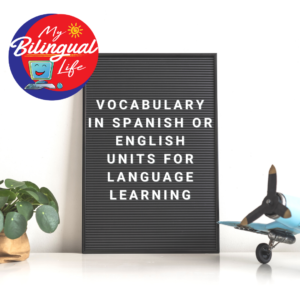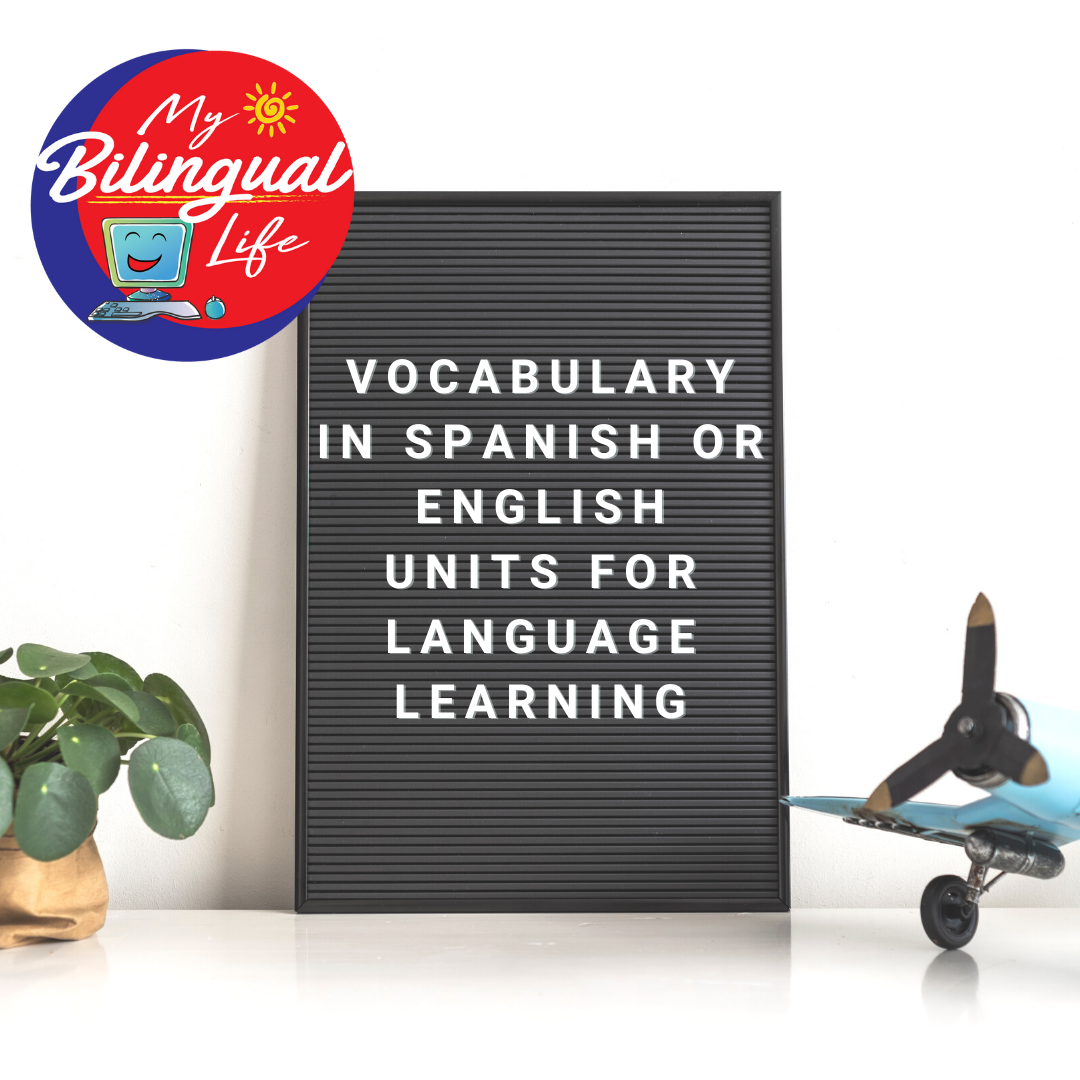Vocabulary in Spanish and English

Learning vocabulary in Spanish or English is one of the pillars of language learning. It is a constant challenge for students to learn and remember new vocabulary in the target language. I constantly tell my students that they need repeated exposure to the words in order to remember them and add them to their “useable” vocabulary. Obviously, I help my students get this repeated exposure in my class.
Strategies for Learning Vocabulary
First, I present my vocabulary in themed units. This helps the students have a point of reference. I make sure to point out any cognates or close cognates with the words and I share any tricks I use to remember the words myself. (At this point, I don’t have to rely on these “tricks” to remember most of the vocabulary, but it helps my students start to figure out their own vocabulary tricks.
Flashcards
I start the vocabulary units with flashcards. I try to use pictures that are clear representations of the words, or pictures that will stick in their memory (cute or silly animals help). I encourage my older students to create their own flashcards with their own images.
I use the flashcards whenever I review the words with the students. This gets the image and the word linked in their memory. I teach the students various ways they can practice with the vocabulary cards. Flashcards are always in the learning center for the students to use. (Also, a side benefit is that it can be a confidence boost when the student sees a whole stack of words that he or she knows!)
Memory Matching Games
One of the reviews I like to use with my students is memory matching games. I can make a printable version of these by simply printing two sets of flashcards. I also make a digital version that we can play online or on the interactive whiteboard using Powerpoint. Rather than students competing against each other, I set it as a class challenge to find all of the matches. The students are engaged and help each other as they search for the matches. Since I use numbers on the square, the students are also practicing their numbers in the target language.
I Have, Who Has
This is another great review game that students love to participate in. It is a bit challenging to use this online, but it can be done by sending each student a “card” in a private chat. I will say this game is much less prep work in person. This card has the students repeating the target vocabulary over and over. The students are engaged and have fun as they work through the cycle.
Vocabulary Worksheets
I use a variety of worksheets with my students to practice vocabulary depending on their needs. I have simple handwriting worksheets in both print and cursive. I have matching sheets as well as “draw the picture” sheets.
When the students are beginning to use the vocabulary, I will start working with the students with fill-in-the-blank sheets that use the vocabulary in different sentence structures. For example, maybe we have been talking about the sun (sol) in our summer unit. I might have an exercise that has a fill-in-the-blank about the sun being the closest star to Earth. This helps the students use the vocabulary in different contexts than just the original theme we were studying.
Riddles
My students love when we do the vocabulary riddles. After we have been working with the words for a bit, I will use these riddles as another practice. I will give the students clues in the target language that will help them discover the answer which is one of the vocabulary words. These riddles are helpful because the clues are in a natural context and often there are new words they learn in the clues that are directly related. These are great vocabulary boosters!
If I want to extend the riddles experience, I ask my students to create their own riddles. Then they can present them to a partner, their small group, or the whole class depending on the time I have available for the activity.
Make sure to check out this post where I discuss putting together the riddles and how I use them in class.
Would You Rather?
This is one of the favorite activities in my classroom. I try to have one with every vocabulary theme so that we can pull them out as we need an extra activity. These questions use the vocabulary words and I expect students to use the vocabulary we have been studying. This article discusses several ways that I use the Would You Rather games in my classroom.
Assessment Tools
There are several digital assessment tools that are helpful for checking the students’ vocabulary adquisition. Many of my vocabulary units on Teachers Pay Teachers include either an Easel assessment that is accessible through TPT itself or a Boom Cards assessment. There are other possible assessments, but these are self-checking and do not require me to conduct them.
When looking at vocabulary acquisition, I am more concerned that the student is making progress than exactly what percentage he/she is getting correct. My ultimate goal with vocabulary is that the student can use it naturally in conversation so I do not place the emphasis on simply “knowing” the word. I keep pushing the words that we have learned and I constantly review the words in the previous units.
Conclusion
Vocabulary is a very important part of learning a language. It should be something that is constantly being expanded upon. I hope this post has given you some ideas on how you can review vocabulary in your classroom. I do have some vocabulary units available on Teachers Pay Teachers to help you get started. I have a variety of activities for several themes of vocabulary and I am constantly creating more vocabulary products. If there is a particular unit or activity that you need, feel free to contact me. I’d love to help you help your students!

Leave a Reply